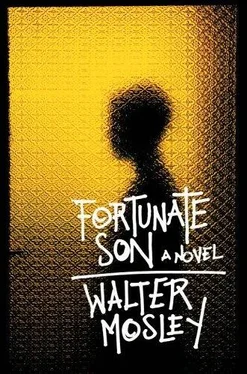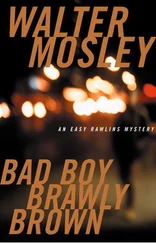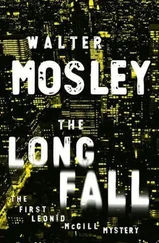Thomas noticed these things, categorizing, listing, and hoping somehow the knowledge would save him from another beating, still knowing that nothing would save him. Nothing ever would.
“You got money in yo’ pocket, suckah?” the tall eight-year-old leader asked.
Thomas breathed in through his mouth and shook his head — no.
The backhand stung his left cheek. He felt a trickle of blood come out of his left nostril.
“Empty yo’ pockets, man,” another boy said.
Thomas looked at all eight eyes staring angrily at him. Years later he would wake up from a nightmare about those eyes, not in fear of violence but from the sad memory of their hatred.
Fight ’em back, he heard his father say. And then he turned to run. But his feet got tangled up, and he fell right there in front of his enemies.
“Kick his ass!” a boy shouted.
Thomas rolled up like the gray-shelled pill bugs he would watch in the garden. He closed his eyes and made ready to count the blows, but instead he heard a girl shouting. He wondered if the boys had attacked somebody else, somebody behind him.
He opened his eyes and raised his head.
A very large black girl (who looked somehow familiar) was punching the ringleader of the gang in the face. The other boys rushed at her, but she slapped one, punched another, and kicked the third, one, two, three times. The first boy she hit was crying. Thomas hadn’t believed that those mean boys could cry. The other three were running.
“Git!” the big girl yelled, and stamped her foot on the concrete.
The crying boy let out howling.
“You show’em, girl,” the old woman from across the street called. “Show them li’l niggahs a thing or two.”
The girl turned her head toward Thomas, and the boy quailed. He thought that she would destroy him now with her fists and feet and loud shouts. But instead Bruno ran up from nowhere and held out his hand.
“Come on, Lucky,” the jolly first-grader said. “Git up.”
The girl reached down too. For a moment Thomas felt weightless, and then he was standing on his feet.
“This Monique,” Bruno said in the way of an introduction. “My sister. She’s twelve, in junior high.”
“Hi,” the big girl said. She smiled. “That li’l Alvin Johnson need somebody to kick his butt ev’ry mornin’. That’s the on’y way he evah gonna do right.”
“I told Monique about you, Lucky. I told her you talked funny but you might get lost on the way to school. So she walked me ovah here.”
Thomas was very happy. He laughed, and big Monique smiled down on him.
“Don’t you know the secret way to school?” she asked him.
He shook his head.
“Com’on,” Monique said, and with a wave of her hand she led them down the driveway of the house with the leashed dog.
When it barked at her, she got down on her knees and held out her hand. The dog growled, then sniffed, then licked her fingers.
Thomas knew that if he tried that the dog would bite his whole hand off.
Behind the house was a fence with a hole in it that led to the blocked-off alley behind Elton’s house. Back there sapling trees grew in profusion and birds sang and small creatures scuttled. There were pools of water with bright-green algae growing over them and an old redbrick incinerator that housed a large rodentlike creature.
“This alley was blocked off a long time ago,” Monique was explaining. “An’ it go all the way to the end of the block. All you got to do is climb through the fence next to the church and cut through the back’a there an’ you across the street from the school. Not so many other kids do it ’cause the hole is too small.”
“Thank you, Monique.”
“What’s your real name?” she asked.
“My name is Tommy, but everybody calls me Lucky.”
“You right, Bruno,” Monique said. “He do talk funny.”
Eight years after Thomas met Monique, a fourteen-year-old Eric Nolan was getting ready to play a match on a public tennis court above Santa Monica Boulevard in Beverly Hills. He was set to play against an older boy from his school, Hensley High, which was known as the Yale of private high schools. The boy, Drew Peters, was a seventeen-year-old twelfth-grader who had already been accepted to three Ivy League schools for the following year.
Drew had called Eric’s class a bunch of pussies, and then he pushed around Limon, a delicate Peruvian boy who was also in the tenth grade. Eric told Drew that he couldn’t even play tennis and challenged him to a match. Eric agreed that if he lost he’d pay Drew a hundred dollars and carry him around the track on his back. But if Drew lost he’d have to go down on his knees and ask Limon to forgive him.
Both classes showed up for the match, which took place at 4:00 p.m. on a cloudy Saturday afternoon. The upperclassmen came into the bleachers all cool and superior. The sophomore class was loud and cheering. And even though Eric was a year younger than most of his classmates, he was the best of them, and they loved him for daring to challenge a boy who was almost four years older. Drew was in the California Junior Tennis League and had placed second in the statewide tournament.
In the front row of the senior side of the bleachers sat Christie Sadler, whose father, it was said, owned a riverfront block in Paris. Christie was the prettiest girl in any class at Hensley. She looked like a woman already, tall and lithe with violet eyes and skin that defied comparison. Mr. Mantel, the English teacher, had been fired midyear for suggesting to Christie that she would get the grade she was looking for if they could go out on a date.
Christie and Drew were the perfect couple at school. They’d be king and queen of the prom. They were definitely having sex.
Eric wasn’t thinking about any of that when he came out onto the court. He liked playing tennis. It was a sport where he didn’t need clumsy teammates who competed with one another. He liked things one on one or, even better, sports where he could excel without competition, like diving or running.
But Drew had roughed up Limon, and Limon was the closest thing to a friend that Eric had. Not that they were really friends. Limon talked too much, and he always wanted advice about how to be more popular and better in school. He wasn’t satisfied with his life, and Eric looked down on that.
Don’t you mind it when you lose at tic-tac-toe? Eric had asked Thomas sometime before his brother disappeared forever.
Nuh-uh.
Why not?
I’ont know, Thomas said. I guess it’s just fun to play. And anyway, if you win and you’re my brother, then in a way I win too.
The day of the match was cloudy and cool. So was Drew, with his light-gray tennis clothes and serious brow.
Drew’s father had offered to judge the match. Mr. Peters was hale and tall. He had red hair everywhere and skin that had seen a lot of sun. The Peters family made their money in construction. He was a hard man, and Eric was confident that he wouldn’t cheat to favor his son.
But even if he did, Eric expected to win the match anyway. He always won when it was important. He was, as his Episcopalian minister, Uncle Louis, always said, “born in the circle of light.”
Eric hadn’t told his father about the match. He never wanted Minas or Ahn to be anywhere where he was the center of attention. Something about that talk with Ahn the night after Lester Corning was scarred had made him leery of the trouble he might cause. For the next few weeks after the accident, Eric asked about his real mother and what had happened.
She succumbed after childbirth, Minas had said in simple doctorese.
Having me, Eric said.
Читать дальше












